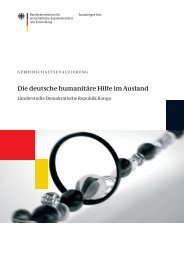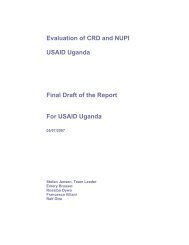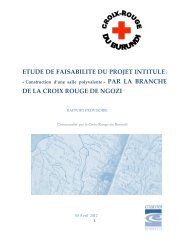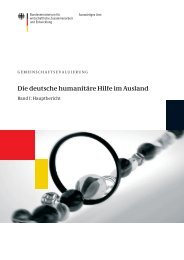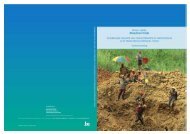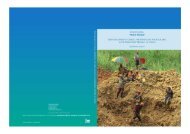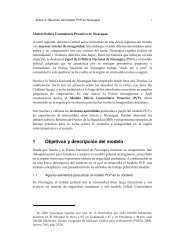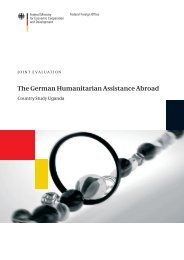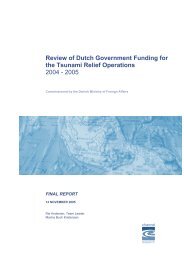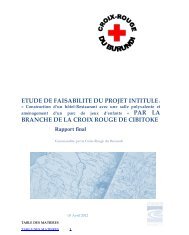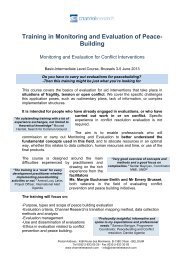A ripple in development? - Channel Research
A ripple in development? - Channel Research
A ripple in development? - Channel Research
Create successful ePaper yourself
Turn your PDF publications into a flip-book with our unique Google optimized e-Paper software.
There is an issue also with the “last mile” of the warn<strong>in</strong>g system.<br />
Although there has been good progress <strong>in</strong> the south of Sri Lanka with<br />
the erection of tsunami warn<strong>in</strong>g towers, only one of the planned six<br />
towers have been erected <strong>in</strong> the east of the country. Members of the<br />
affected population there denied ever hav<strong>in</strong>g received any tsunami alert<br />
s<strong>in</strong>ce 2004, whereas those <strong>in</strong> the South have received three warn<strong>in</strong>gs.<br />
However, the National Disaster Management Centre acknowledges<br />
that progress <strong>in</strong> the East has been slow due to the previous security situation<br />
there, but that quickly progress is now expected.<br />
As well as the formal early-warn<strong>in</strong>g system, there is an <strong>in</strong>formal<br />
warn<strong>in</strong>g system <strong>in</strong> operation. Every time any earthquake is reported <strong>in</strong><br />
Indonesia, people get phone calls from relatives and contacts overseas to<br />
warn them about the tsunami risk. People also pass on tsunami warn<strong>in</strong>gs<br />
to each other. This led to the situation <strong>in</strong> October where a false<br />
alert <strong>in</strong> the South quickly spread through the area and had to be officially<br />
denied with media announcements and SMS messages.<br />
Ask<strong>in</strong>g people about which types disasters they feel better prepared<br />
for now illustrates this strong concentration on preparation aga<strong>in</strong>st tsunami<br />
hazards, both for Sir Lanka and for Indonesia.<br />
The Indonesian Red Cross has <strong>in</strong>itiated a new community based<br />
risk reduction programme that seeks to <strong>in</strong>crease communities’ capacities<br />
to deal with disasters and reduce risk. Tra<strong>in</strong>ed Indonesian Red<br />
Cross staff goes to the communities and offers tra<strong>in</strong><strong>in</strong>g. If there is an<br />
<strong>in</strong>terest, a village committee is established with up to 20 persons. They<br />
are tra<strong>in</strong>ed to develop a hazard, vulnerability and capacity assessment,<br />
and a risk map. However <strong>in</strong>terest <strong>in</strong> undergo<strong>in</strong>g the tra<strong>in</strong><strong>in</strong>g, as detected<br />
dur<strong>in</strong>g the field visit for this evaluation, is very variable, probably<br />
because the two weeks needed for the tra<strong>in</strong><strong>in</strong>g represents a huge opportunity<br />
cost for most villagers.<br />
When one compares the preparedness of communities for different<br />
risks, it becomes clear although most of the disaster preparedness tra<strong>in</strong><strong>in</strong>g<br />
was concentrated on tsunami risks, that people have been able to<br />
analyse this and see that some of it could also be applied to other disaster<br />
types.<br />
5.7 Significance of impact<br />
The lack of well-documented major disasters <strong>in</strong> the tsunami-affected<br />
zone 79 s<strong>in</strong>ce the tsunami means that the theoretical proposition (that<br />
comprehensive DRR limits the extent of disasters) could not be tested<br />
conclusively. However, the research did highlight some po<strong>in</strong>ts around<br />
the l<strong>in</strong>kages between changes <strong>in</strong> vulnerability and <strong>development</strong>.<br />
79<br />
There were serious floods <strong>in</strong> Aceh <strong>in</strong> late 2006, but these primarily affected the <strong>in</strong>terior rather<br />
than the tsunami-affected coastal strip. Barron, P., Clark, S., Daud, M., Fahmi, A. Z., Hasibuan,<br />
Y., Mawardi, A., & Rusli, M. (2007). Aceh Flood. Damage and Loss Assessment. Banda Aceh:<br />
World Bank.<br />
93



